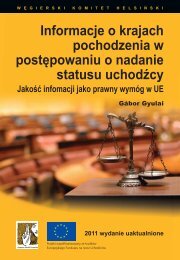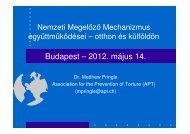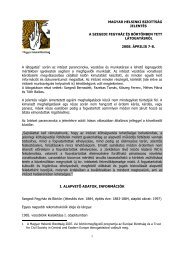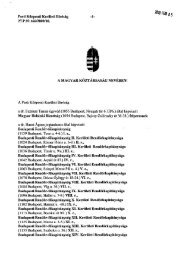Country Information in Asylum Procedures Quality as a Legal Requirement in the EUThe Board reminds that the refugee status determination procedure does not have as objectivethe in abstracto establishment of the human rights situation in a given country, but rather thecase-by-case evaluation of whether or not an asylum-seeker has reasons to fear persecution [...]Reflecting the above principles, numerous senior European courts refer to the lackof case-specific, concrete COI or the use of general information with weak or no linksto the given particular case when cancelling a lower-instance decision on refugee status.The jurisprudence of Hungary (HU-01, HU-05, HU-06, HU-08), the Czech Republic(CZ-05, CZ-06, CZ-10), Austria (AT-07), Bulgaria (BG-03), Slovakia (SK-09, SK-18,SK-19), Slovenia (SI-04), Belgium (BE-12) and Sweden (SE-01) may be referred to inthis context. At the same time, judgments of the French Refugee Appeal Board (FR-01) and the UK Immigration Appeal Tribunal (UK-05) used the same reasoning butin connection with materials presented by the appellant when dismissing an appeal.The latter decision may be of particular interest as it firmly criticised the practice ofsubmitting vast COI materials to adjudicators without pointing out relevant case-specificparts thereof:We deplore the practice of filing enormous bundles of irrelevant documents especially inpublicly funded cases and there is no authority for requiring the Adjudicator to read thewhole of such bundles unless his attention is drawn to them.The above-referred Slovak judgment (SK-09) can also be deemed an especiallyinteresting one as the Regional Court of Košice went beyond the simple requirement ofconsidering individualised COI when ruling thatQuotations from country of origin information sources cannot be summarised without givingreference to their relation with concrete facts of the case, which served for the decision-makeras the basis of considering and deciding the case.In SI-09, the Supreme Court of Slovenia established an interesting distinctionbetween “specific” (individualised) and “general” COI: 49(...) the information that constitute specific COI are detailed, thorough and related exclusivelyto the given case, therefore, they are linked to the concrete subjective circumstances orevents, directly related to the applicants, to what occurred to them or the information areused to verify the applicant’s statements concerning personal circumstances and reasons forpersecution. General COI, which are accessible to all, are facts of general knowledge and neednot to be proven, and therefore in principle [...] a prior confrontation of those informationwith the applicant (who should be knowledgeable about the situation in the country she/hecomes from) is not necessary.While most of the cited judgments deal with refugee status determination in general,the relevant Hungarian (HU-05, HU-06, HU-08) jurisprudence and a judgment ofthe High Administrative Court of Bulgaria (BG-03) set the same standard as to theapplication of the safe country of origin concept. 50 As the requirement of individualisation49Cf. Law on International Protection, Section 23 (1) – full citation in Chapter VI.2.150In these jurisdictions, at the time of passing the judgments in question, the application of safe country of originconcept also referred to the assessment of the applicant’s entitlement to subsidiary protection (not yet fully inline with the common EU concept thereof).36
Standard 1 Legal Relevance of COIis in some countries less clear and less widely accepted when assessing the entitlement tosubsidiary forms of protection or when applying “safe country” concepts than in regularrefugee status determination, the above judgments are definitely of importance.VI.3 Mandatory Assessment of “Actual” Legal PracticesVI.3.1 LegislationAnother binding provision of EU asylum legislation that can be referred to in connectionwith the legal relevance of COI is set forth by Article 4 (3) (a) of the QualificationDirective and reads as follows:3. The assessment of an application for international protection is to be carried out on anindividual basis and includes taking into account:(a) all relevant facts as they relate to the country of origin at the time of taking adecision on the application; including laws and regulations of the country of originand the manner in which they are applied;The Procedures Directive further elaborates on the same principle in connectionwith the safe country of origin 51 and the safe third country 52 concept. These provisionsoblige member states to examine not only what the law says in a certain country, butto assess to what extent and in what manner the provisions in question are applied.From a COI professional’s point of view, the importance of this provision lies withinthe fact that it prevents decision-makers from using exclusively the text of laws of thecountries of origin as factual evidence. While such legal provisions may be in line withhuman rights principles or seem to ensure protection against persecution and other sortsof harm, in practice they often fail to do so.EU member states transposed the above criterion into their national legislation.A rather particular legislative interpretation can be referred to in Slovenia, where thelaw-maker decided to link the “regulations of the country of origin” to the concept of“general” COI and the “manner in which they are applied” to “specific” COI. 53 Thisapproach may be questionable in light of the fact that mere legislative provisions (e.g.existence of “moral crimes” or the criminalisation of draft evasion or homosexuality) canconstitute COI of great individual impact on an applicant, while information on howhuman rights standards embedded in law are applied in practice can also be of rathergeneral character.51Procedures Directive, Article 30 (4) and Annex II52Ibid., Article 27 (1) and 36 (2)53Law on International Protection, Section 23 (1) – full citation in Chapter VI.2.137







